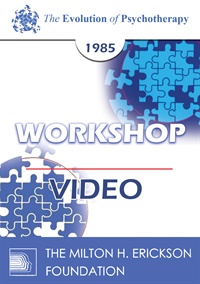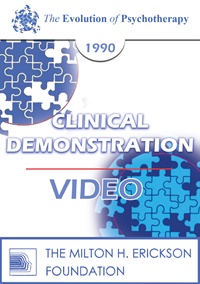- Average Rating:
- Not yet rated
- Topic Areas:
- Topical Panels | Humor | Psychotherapy | Therapist Development
- Categories:
- Evolution of Psychotherapy | Evolution of Psychotherapy 1985
- Faculty:
- Murray Bowen, MD | Albert Ellis, PhD | Robert L. Goulding, MD | Ronald Laing, MD
- Course Levels:
- Master Degree or Higher in Health-Related Field
- Duration:
- 57:10
- Format:
- Audio and Video
- Original Program Date:
- Dec 14, 1985
- Short Description:
- Topical Panel 14 on Therapeutic Uses of Humor, featuring Murray Bowen, MD, Albert Ellis, PhD, Robert L Goulding, MD, and Ronald D Laing, MD. Moderated by John C Racy, MD.
- Price:
-
Sale is $29.00
price reduced from Base Price - $59.00
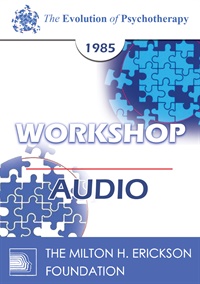
- Average Rating:
- Not yet rated
- Topic Areas:
- Workshops | Psychotherapy | Meditation, Spirituality and Yoga | Therapist Development
- Categories:
- Evolution of Psychotherapy | Evolution of Psychotherapy 1985
- Faculty:
- Ronald Laing, MD
- Duration:
- 2 Hours 7 Minutes
- Format:
- Audio Only
- Original Program Date:
- Dec 11, 1985
- Short Description:
- This is a theoretical and practical exposition of how to increase the efficacy of therapeutic techniques. Demonstration and experiential exercises.
- Price:
- $15.00 - Base Price
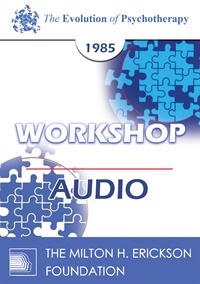
- Average Rating:
- Not yet rated
- Topic Areas:
- Workshops | Virginia Satir | Family Therapy | Psychotherapy | Therapist Development
- Categories:
- Evolution of Psychotherapy | Evolution of Psychotherapy 1985
- Faculty:
- Virginia Satir, MA, ACSW | Mary Goulding, MSW
- Duration:
- 2 Hours 16 Minutes
- Format:
- Audio Only
- Original Program Date:
- Dec 11, 1985
- Short Description:
- This workshop will center around a videotape of my work. Discussion will focus around what I see, how I choose the moment of intervention, and the kinds of intervention I choose. Concepts will be related to the theory underlying my practice as a family therapist.
- Price:
- $15.00 - Base Price
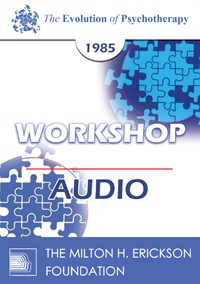
- Average Rating:
- Not yet rated
- Topic Areas:
- Workshops | Psychotherapy | Therapist Development
- Categories:
- Evolution of Psychotherapy | Evolution of Psychotherapy 1985
- Faculty:
- Joseph Wolpe, M.D.
- Duration:
- 2 Hours 27 Minutes
- Format:
- Audio Only
- Original Program Date:
- Dec 11, 1985
- Short Description:
- An exposition of the methods of obtaining from neurotic patients the information necessary for selection of techniques, description of the most common techniques, demonstration of relaxation training and assertive training.
- Price:
- $15.00 - Base Price
- Average Rating:
- Not yet rated
- Topic Areas:
- Workshops | Psychotherapy | Therapeutic Relationship | Therapist Development
- Categories:
- Evolution of Psychotherapy | Evolution of Psychotherapy 1985
- Faculty:
- Carl Rogers, PhD | Ruth Sanford, MA
- Course Levels:
- Master Degree or Higher in Health-Related Field
- Duration:
- 2:55:50
- Format:
- Audio and Video
- Original Program Date:
- Dec 11, 1985
- Short Description:
- A brief discussion of my experience with demonstration interviews. A "client" will be selected from among those who volunteer. A thirty-minute demonstration interview will be held, followed by interaction between the group, the client and me.
- Price:
- $59.00 - Base Price
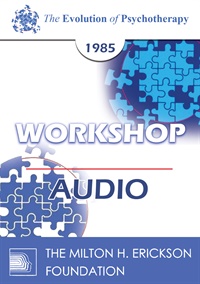
- Average Rating:
- Not yet rated
- Topic Areas:
- Workshops | Psychotherapy | Therapist Development
- Categories:
- Evolution of Psychotherapy | Evolution of Psychotherapy 1985
- Faculty:
- Joseph Wolpe, M.D.
- Duration:
- 2 Hours 48 Minutes
- Format:
- Audio Only
- Original Program Date:
- Dec 12, 1985
- Short Description:
- This will be an opportunity to make behavior analyses of well-studied cases of attendees with directions, if feasible, for behavioral treatment.
- Price:
- $15.00 - Base Price
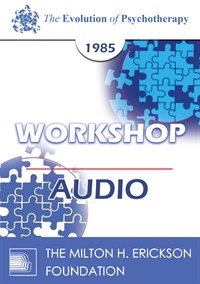
- Average Rating:
- Not yet rated
- Topic Areas:
- Workshops | Gestalt | Therapist Development | Psychotherapy
- Categories:
- Evolution of Psychotherapy | Evolution of Psychotherapy 1985
- Faculty:
- Miriam Polster
- Duration:
- 1 Hour 32 Minutes
- Format:
- Audio Only
- Original Program Date:
- Dec 13, 1985
- Short Description:
- Change in psychotherapy is a gradual process with predictable stages which can be understood and prepared for. Integrating new perspectives and behaviors requires attention to the needs of each of three phases: support, accommodation, and assimilation. These stages will be defined and demonstrated in work with volunteer workshop participants.
- Price:
- $15.00 - Base Price
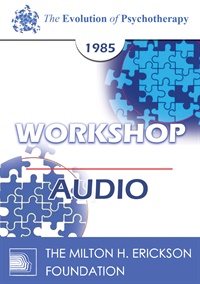
- Average Rating:
- Not yet rated
- Topic Areas:
- Workshops | Humor | Psychodrama | Therapeutic Relationship | Therapist Development | Psychotherapy
- Categories:
- Evolution of Psychotherapy | Evolution of Psychotherapy 1985
- Faculty:
- Zerka Moreno
- Duration:
- 2 Hours 37 Minutes
- Format:
- Audio Only
- Original Program Date:
- Dec 14, 1985
- Short Description:
- Because of the weight of clients difficulties, the employment of lighter areas of experience is often indicated, both for cathartic relief as well as for providing closure. The session will focus on joy, humor, tenderness.
- Price:
- $15.00 - Base Price
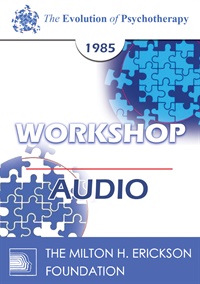
- Average Rating:
- Not yet rated
- Topic Areas:
- Workshops | Psychotherapy | Therapist Development
- Categories:
- Evolution of Psychotherapy | Evolution of Psychotherapy 1985
- Faculty:
- Murray Bowen, MD
- Duration:
- 2 Hours 27 Minutes
- Format:
- Audio Only
- Original Program Date:
- Dec 15, 1985
- Short Description:
- Presented will be a teaching tape on the values and perils of therapist-oriented (undifferentiated) eclecticism. The therapist, whether he likes it or not, is a model for the family. An unsure therapist is a poor model when a well defined family is a goal.
- Price:
- $15.00 - Base Price
- Average Rating:
- Not yet rated
- Topic Areas:
- Clinical Presentations | Resistance | Psychotherapy | Therapeutic Relationship | Therapist Development
- Categories:
- Evolution of Psychotherapy | Evolution of Psychotherapy 1990
- Faculty:
- James Bugental, PhD
- Course Levels:
- Master Degree or Higher in Health-Related Field
- Duration:
- 1:00:53
- Format:
- Audio and Video
- Original Program Date:
- Dec 13, 1990
- Short Description:
- Educational Objectives: To learn interview techniques for reducing client resistances to being genuinely engaged with the therapeutic work and to be able to facilitate client inner exploration To understand the division of responsibility in which the client leads content and the therapist modulates process
- Price:
- $59.00 - Base Price
Please wait ...



